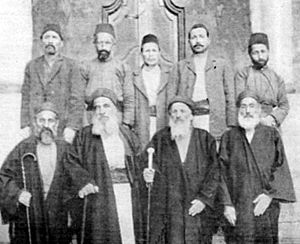Back in May, I wrote a blog post entitled Can I Convert to Judaism Online? I’ve been doing some thinking about it, and today I am ready to share some new thoughts.
I am enthusiastic about conversion to Judaism. I became a Jew as an adult, and it has been a challenging and rewarding path.
I am an old hand in online communities. My brother gave me a 300 baud modem for my 30th birthday in 1985, and I’ve been online ever since. I’ve seen some of the best and the worst the online world can do in terms of community. I’ve learned and taught online.
Online resources are a mixed bag for conversion to Judaism. There is a wealth of information available online, and some of it is very good. Some of it is quite awful. A story to illustrate what a bad source of info can do for you: My Hebrew name is Ruth. I originally chose that name because I read “somewhere” that all female converts to Judaism had to take the name Ruth. When my rabbi asked me what name I had chosen, I said “Ruth” because I thought it was some kind of a test. He said “Good choice!” and put my new name on the shtar (document) of conversion. It was months before I found out that I had had a choice. I’m fond of my name, now, but I wish I’d asked more questions!
Judaism is a communal religion. Ever since the beginning, Judaism has been a practice of a living community. Abraham and Sarah were the first community of Jews, but it was not long before they were surrounded by a community. Genesis 12:5 says that they set out “with all the souls they made in Haran.” Traditionally we understand that phrase to mean that Abraham and Sarah welcomed others to their way of life.
I learned how to behave as a Jew from spending time with other Jews. I ate at the home of fellow Jews, celebrated holidays with them, copied them when I didn’t know what to do, asked questions, prayed with a minyan, studied in classes with Jews, asked more questions, and found my way to an ever-evolving practice of my own. It doesn’t happen privately or in a vacuum: I did this, and continue to do this in community with other Jews.
Important Jewish activity takes place with a minyan present, a quorum of ten Jews. They don’t have to be rabbis, they don’t have to be anything but adult official Jews, but we don’t say Kaddish, we don’t say Barechu, we don’t read Torah without those other nine Jews.
This is my great objection to conversion that happens purely online: a person may work with a rabbi, they may have a reading list and a to-do list, and they may even travel to meet the rabbi from time to time, but if they are not growing up Jewishly in a community with other Jews, they’re missing out on an essential part of the process: they aren’t spending actual time with actual Jews.
We are called “a stiff-necked people” and we’re all that and more. There’s a running joke about the guy who loves Judaism but can’t stand Jews. As someone told me after my conversion: “The good news is: you’ll never be alone again. The bad news is: you’ll never be alone again.”
There are rabbis online who will sign you up for a class or three, give you a reading list, and work with you for a conversion. Depending on that rabbi’s credentials, it may or may not be a valid conversion (more on that in a future post.) But my point here is: if you want even a minimally good conversion process, you need not only a rabbi, not only a beit din, not only a mikveh — you need a real Jewish community.
A real Jewish community has wonderful people, annoying people, breath-takingly smart people, staggeringly stupid people, Democrats, Republicans, Independents, crackpots, menschen, and that’s just the short list. You’re going to love some, and others you will duck when you see them coming. And that is part of being a Jew, being part of a big, unmanageable tradition with saints like Abraham Joshua Heschel and embarrassments like Bernie Madoff.
If your heart is tugging you towards Judaism, don’t settle for an “online conversion.” Call your local synagogues, and find a rabbi and a community with whom to explore Judaism. If there is no local synagogue, then ask yourself if you, like Abraham, need to “get out of your land, and from your kindred, and from your father’s house, and into the land which [God] will show you.” [Genesis 12:1]
If it is meant to be, then a Jewish community is waiting for you.





 She wrote to her mailing list about my
She wrote to her mailing list about my 




